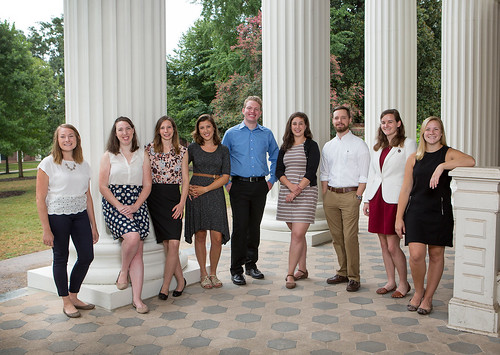Twelve students from the University of Georgia have received the National Science Foundation’s Graduate Research Fellowship Program Awards (GRFP), which recognizes and supports outstanding early career graduate students in NSF-supported science, technology, engineering, and mathematics disciplines who are pursuing research-based master’s and doctoral degrees.

As the oldest fellowship of its kind, the GRFP has a long history of selecting recipients who achieve high levels of success in their future academic and professional careers. NSF Fellows are anticipated to become knowledge experts who can contribute significantly to research, teaching, and innovations in science and engineering.
The 2016 National Science Foundation’s Graduate Research Fellowship Program Awards winners are the following graduate students:
Jennifer Cyr, a Ph.D. student in the College of Veterinary Medicine’s Department of Infectious Diseases, researches African spiny mice, mammals that are capable of healing wounds without forming scars. She is studying the cellular, immunological, and ecological mechanisms behind this unique wound healing process in order to see how these mechanisms affect the responses of spiny mice to different infections.
Michelle Evans, a Ph.D. student in the integrative conservation and ecology, is interested in the effects of land-use change on disease dynamics and ecology. She specifically investigates the mechanisms driving diversity-disease relationships and how anthropogenic activities alter this relationship.
Aileen Ferraro, a Ph.D. student in the Department of Microbiology, studies gene regulation in eukaryotic cells using the model filamentous fungus Neurospora crassa. She is interested in how different modifications to chromosomes can either silence or activate different sets of genes, which can greatly impact the health and biology of the organism.
Maite Ghazaleh, a Ph.D. student studying environmental health science in the College of Public Health, aims to understand the mechanisms driving coral disease. Corals are hosts to several species of microbial organisms that interact closely with the coral and collectively form the coral microbiome. To describe disease development, she studies how environmental stress can cause the coral microbiome to shift from a healthy to a diseased state.
Sarah Harrison, a Ph.D. student in the Department of Marine Sciences, studies the fate of oil in the marine environment. She works in the Gulf of Mexico, a dynamic environment home to hundreds of natural oil seeps and active oil and gas industries, to study how the smallest forms of life respond to oil in surface waters. She also researches how the oil itself changes as a result of this biodegradation at the surface.
Travis Jones, a Ph.D. student in the Department of Anthropology, focuses on interactions between nomadic hunter-gatherers and sedentary farmers on the North American Great Plains during much of the last millennium. By incorporating chemistry and physics-based techniques to statistical models and social-ecological theory, he hopes to contribute to our understanding of the many ways in which past societies coped and interacted during climatic and ecological episodes.
Kerri Miazgowicz, a Ph.D. student in the College of Veterinary Medicine’s Department of Infectious Disease, investigates how mosquitoes respond to environmental variation. These responses can affect basic traits such as how long a mosquito will live for, or more complex traits such as the immune response of the mosquito – all of which will dictate the susceptibility and thus the potential for these mosquitoes to transmit diseases.
Micah Miles, a master’s student in the Warnell School of Forestry and Natural Resources, studies the urban ecology of reptiles and amphibians in the Santa Monica Mountains National Recreation Area. He also works to further public awareness about urban wildlife and increase environmental literacy for all ages by collaborating with artists to create signs for urban parks and green spaces.
Paige Miller, a Ph.D. student in the Odum School of Ecology, integrates ecological, epidemiological, and dynamical systems theory to improve our ability to probe “tipping points” in ecological and epidemiological systems where a sudden and large change occurs. Examples include collapses of fish populations, abrupt changes in climate, and outbreaks of infectious diseases. Interestingly, these systems all exhibit similar signals prior to the tipping point that we may be able to detect.
Michael Paxhia, a Ph.D. student in the Department of Microbiology, investigates how cellular metabolism functions as an integrated network, and how cells adjust their network to incorporate new biosynthetic pathways. This research into the fundamental paradigms of metabolism may facilitate new applications in synthetic biology, making the production of biofuels, small molecules or pharmaceuticals with microbes more predictable.
Kelly Peterson, a Ph.D. student in the Odum School of Ecology, is interested in the restoration of degraded ecosystems, particularly tallgrass prairie. Her research focuses on the importance of genetic diversity in plant populations, and how that genetic diversity may help or harm plant species in small populations and in restored ecosystems.
Michelle Ziadie, a Ph.D. student in both the Office of STEM Education and the Department of Genetics, researches evolutionary genetics and undergraduate evolution education. In her genetics work, she studies the evolution of adaptive maternal effects using a species of beetle that displays elaborate parental care. Her STEM education investigates student thinking regarding concepts and processes in evolution.
